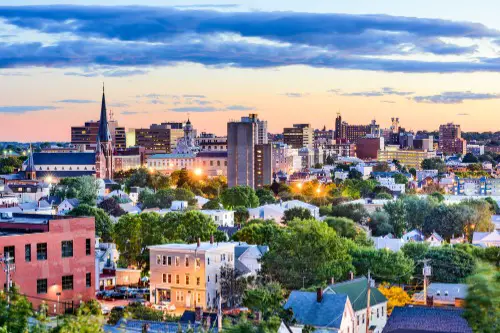1. California

California has always been a leader in environmental policies, and it made headlines in 2022 by approving the Advanced Clean Cars II rule. This regulation requires all new passenger cars sold in the state to be zero-emission by 2035, according to Reuters. Given California’s history of strict emissions laws and its massive influence on the auto market, this move is expected to set a nationwide precedent. The state is also investing heavily in EV infrastructure to support this transition.
Beyond policy, California has long battled smog and air pollution, especially in cities like Los Angeles. The ban on new gas-powered car sales aligns with its aggressive climate change goals. Automakers selling in the state are already preparing for the shift, with companies like Tesla benefiting from its strong EV incentives. As the world’s fourth-largest economy, California’s decision carries global significance.
2. Washington

Washington state quickly followed California’s lead by adopting similar vehicle emission regulations. In 2022, Governor Jay Inslee announced that the state would prohibit the sale of new gas-powered cars by 2035. The Washington Department of Ecology has been actively working to implement clean transportation policies. With a reputation for progressive environmental laws, the state is committed to reducing its carbon footprint.
Washington is investing in a widespread EV charging network to prepare for the shift. The state also offers incentives for purchasing electric vehicles, making them more accessible to residents. Seattle, in particular, has been a hub for green energy initiatives, further driving the adoption of electric cars. By 2035, Washington expects nearly all new car sales to be electric or hydrogen-powered.
3. Oregon

Oregon has a long-standing commitment to sustainability and clean energy, making it a prime candidate for banning gas-powered cars early. Like its West Coast neighbors, Oregon adopted the Advanced Clean Cars II rule, setting a 2035 deadline for zero-emission vehicle sales, according to the Oregon Public Broadcasting. The state has already implemented policies to phase out older, high-emission vehicles. Its government sees this as a critical step toward meeting its aggressive climate action goals.
Portland, the state’s largest city, has been a driving force in EV adoption. The city has prioritized expanding charging infrastructure and offering tax credits for electric vehicle buyers. Oregon is also working to ensure that rural areas have access to EV technology, closing the gap in clean transportation. With strong political support, the transition is expected to progress smoothly.
4. New York

New York is another major state moving to phase out gas-powered vehicles, aligning with California’s 2035 ban, according to Fox Business. In 2021, then-Governor Kathy Hochul signed legislation requiring all new passenger vehicles sold in the state to be zero-emission by that year. The state government has been aggressive in promoting electric vehicles, offering significant rebates and expanding public charging stations. New York City, in particular, has been leading the charge with clean transportation policies.
Traffic congestion and pollution have long been issues in New York, making EV adoption a priority. The MTA is also shifting toward electric buses, signaling a broader commitment to emissions reduction. With strong political backing and public support, New York is poised to enforce the gas car ban effectively. Given its influence, this move will likely impact the entire East Coast.
5. Massachusetts

Massachusetts has committed to phasing out gas-powered cars by 2035, aligning its policies with California’s regulations, according to CNET. The state has long prioritized clean energy, with strong incentives for both electric vehicle buyers and manufacturers. Its climate action plan outlines aggressive steps to cut emissions from the transportation sector. With a goal of reaching net-zero emissions by 2050, the ban is a logical step forward.
Boston and other major cities are expanding EV charging stations to support the transition. Massachusetts also offers rebates to encourage consumers to switch to electric vehicles. The state’s Clean Energy and Climate Plan highlights transportation as a key sector for emissions reduction. With bipartisan support for environmental initiatives, the transition is expected to gain momentum.
6. New Jersey

New Jersey has made significant progress in pushing for cleaner transportation policies. In 2020, the state passed legislation aimed at dramatically increasing EV adoption and reducing reliance on gas-powered vehicles. Following California’s lead, New Jersey has committed to banning the sale of new gas cars by 2035. Governor Phil Murphy’s administration has prioritized incentives and infrastructure to ensure a smooth transition.
Urban areas like Newark and Jersey City face high pollution levels, making this shift essential for public health. The state has rolled out generous rebates and tax credits to encourage EV purchases. New Jersey is also investing in EV-friendly infrastructure, such as fast-charging stations along major highways. By 2035, the state aims to be a leader in zero-emission transportation.
7. Rhode Island

Rhode Island may be small, but it has big ambitions when it comes to clean energy. The state has committed to phasing out new gas-powered vehicle sales by 2035, following California’s framework. As part of the Northeast’s regional clean transportation efforts, Rhode Island is pushing aggressive emissions reduction policies. State leaders see electrification as a necessary step to combat climate change.
Providence has been expanding its EV infrastructure to accommodate rising demand. The state offers financial incentives to encourage residents to switch to electric vehicles. With strong public support, Rhode Island is accelerating its green energy transition. Its commitment to reducing transportation emissions makes it a frontrunner in banning gas cars.
8. Vermont

Vermont has consistently been one of the most environmentally conscious states in the country. In line with California’s policy, Vermont has pledged to ban the sale of new gas-powered cars by 2035. The state has long championed sustainability, with a high percentage of its energy coming from renewables. Reducing vehicle emissions is a crucial part of Vermont’s long-term climate goals.
The state government has introduced incentives to help residents afford EVs. Rural areas are also being equipped with charging stations to ensure accessibility. Vermont’s small size makes it easier to implement widespread green energy initiatives. With a strong focus on environmental protection, the state is well-positioned for an EV future.
9. Connecticut

Connecticut has set ambitious clean energy targets, and phasing out gas cars is a major part of its strategy. The state has adopted California’s emissions standards, planning to eliminate new gas vehicle sales by 2035. Policymakers are working to expand EV incentives and infrastructure to make the transition seamless. With its commitment to reducing greenhouse gas emissions, Connecticut is a key player in the shift toward clean transportation.
Major cities like Hartford and New Haven are expanding their charging networks. The state government is also working to support lower-income residents in accessing electric vehicles. Connecticut’s transportation sector is a major contributor to pollution, making this transition critical. With strong legislative backing, the shift to EVs is gaining momentum.
10. Maryland

Maryland has joined the group of states adopting California’s clean car rules. The state plans to ban the sale of new gas-powered cars by 2035 as part of its broader climate goals. Maryland has already implemented rebate programs to encourage EV adoption. Expanding charging infrastructure is a priority to ensure residents can transition smoothly.
Baltimore and surrounding areas are working to reduce vehicle emissions significantly. The state is also exploring tax incentives for EV manufacturers. Maryland’s strong focus on climate policy makes it an early adopter of zero-emission vehicle regulations. By 2035, the state aims to lead the Mid-Atlantic in clean transportation.
11. Colorado

Colorado has been making major strides in clean energy policy, and banning new gas-powered cars is part of its long-term plan. The state has adopted California’s emissions standards and aims to transition to 100% zero-emission new vehicle sales by 2035. With its rapidly growing EV market and commitment to renewable energy, Colorado is well on its way to achieving this goal. State leaders see reducing transportation emissions as critical to combating climate change.
Denver and other metro areas have been expanding EV charging infrastructure to support increased demand. The state offers strong incentives for electric vehicle purchases, making them more affordable for residents. Colorado is also investing in electrifying public transportation to further cut emissions. With bipartisan support for clean energy policies, the state is a frontrunner in the EV transition.
12. Maine

Maine is another Northeastern state aligning with California’s goal of banning new gas-powered car sales by 2035. The state has been focused on reducing greenhouse gas emissions and has set ambitious climate targets. Maine’s government has implemented incentives to encourage residents to switch to electric vehicles. Given its dependence on natural resources, protecting the environment is a top priority.
Portland and other cities have been expanding EV infrastructure to prepare for the shift. The state has also been working to make electric vehicles more accessible to rural communities. By investing in clean energy and transportation, Maine is positioning itself as a leader in sustainability. With strong public support and policy backing, it’s one of the states most likely to phase out gas-powered cars first.


